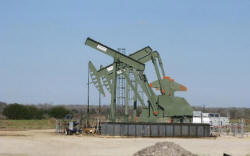|
Global glut to temper oil
price gains this year: Reuters poll
 Send a link to a friend
Send a link to a friend
 [May 31, 2016]
By Apeksha Nair [May 31, 2016]
By Apeksha Nair
(Reuters) - Global oversupply in crude
oil is likely to limit price gains this year despite a series of
unplanned outages and shrinking U.S. shale production, a Reuters
poll showed on Tuesday.
Wildfires in Canada, political unrest in Venezuela and supply
disruptions in Nigeria and Libya have wiped out nearly 4 million
barrels of daily production.
That has soothed some of the concern about oversupply and helped
push oil prices close to $50 a barrel for the first time in seven
months.
But analysts do not expect annual prices to average much more than
that before next year.
In the latest monthly Reuters poll, the 33 analysts surveyed
forecast a 2016 Brent crude <LCOc1> average price of $43.60 per
barrel, up $1.30 from a forecast of $42.30 a month earlier.
That marked a third consecutive monthly rise in forecasts for Brent
prices, which have averaged about $39 so far this year.
But record-high global oil inventories were expected to curb any
major gains for some time.
Brent futures were expected to average $56.40 per barrel in 2017 and
rise to $64.30 in 2018, the poll showed.

"The output disruptions are a key factor supporting prices at the
minute. We don't think prices will go much further from here,"
Capital Economics commodities analyst Thomas Pugh said.
"In fact, we think prices are vulnerable to a downturn in the short
term if some of the disrupted supply returns, or there is evidence
that higher prices are stimulating more production."
The analysts polled by Reuters forecast U.S. crude futures <CLc1>
would average $42 per barrel in 2016, up $1.50 from last month's
poll. U.S. futures have averaged nearly $38 per barrel so far this
year.
Analysts were unanimous in expecting no significant decisions from
this week's meeting of the Organization of the Petroleum Exporting
Countries.
However, some analysts expressed concern over the uncertainty
surrounding Saudi Arabia's strategy as it battles Iran for market
share and after the appointment of new energy minister Khalid Al
Falih.
[to top of second column] |

A pump jack stands idle in Dewitt County, Texas January 13, 2016.
REUTERS/Anna Driver

"We do not expect much from the next OPEC (meeting), given the state
of disarray in producer relations after the Doha meeting. What
people will be scrutinizing is Saudi Arabia's position and intent,
with newly appointed Energy Minister Khalid Al Falih," BNP Paribas
analyst Harry Tchilinguirian said.
Analysts also expressed surprise at the pace at which Iran has
increased production and forecast a return to its pre-sanctions
level of output by the third quarter of this year at the latest.
"The oil market is already oversupplied by about 1-1.5 million bpd.
With Iran likely to increase output by at least 500,000 to 1 million
bpd in the near term, and despite the fall in U.S. shale production
of 600,000-800,000 bpd, the overall market will continue to remain
oversupplied as demand growth is expected to remain weak," said
Rahul Prithiani, director at CRISIL Research.
Most analysts expect supply to match demand next year, but agreed
that it could take much longer for the market's overhang of unused
inventories to clear.
(Editing by Amanda Cooper and Jason Neely)
[© 2016 Thomson Reuters. All rights
reserved.] Copyright 2016 Reuters. All rights reserved. This material may not be published,
broadcast, rewritten or redistributed.
 |